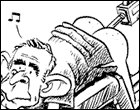 Harper Keeps Ministers From Reporters, Boosts Support
Harper Keeps Ministers From Reporters, Boosts Support
Theophilos Argitis
{'Harper may be modeling his stance after his southern neighbor's. Bush has adopted similar tactics, not allowing senior advisers to talk, clamping down on government leaks and awarding interviews to journalists deemed more sympathetic.'}
April 14 (Bloomberg) -- About an hour after he was sworn in as Canada's defense minister, Gordon O'Connor headed through the foyer of Parliament toward half a dozen waiting journalists. O'Connor walked by, saying he never speaks ahead of cabinet meetings.
Prime Minister Stephen Harper and his top ministers have snubbed the Ottawa press corps since their minority government took power in February -- answering few questions, controlling press conferences and restricting reporters' movements on Parliament Hill.
The measures may be helping Harper, an economist from Calgary whose popularity has risen since he took office. The tight leash on his cabinet allows Harper to avoid mistakes that could undermine his chances of winning a majority in elections that could occur as early as next year.
``He's afraid the media will exploit little cracks and openings,'' said Nelson Wiseman, a political science professor at the University of Toronto, who says the strategy mimics that of U.S. President George W. Bush. ``A lot of these ministers don't have any experience. They're still trying to figure out where the washrooms are.''
The Conservative Party government's approval rating is 62 percent, up eight percentage points from early February, according to an Ipsos-Reid poll released March 25. A poll published last week by Environics showed Harper's personal approval rating has almost doubled to 60 percent since October, giving him enough support for a majority government if an election were held today. His minority administration now needs the support of opposition parties to pass laws.
Agenda Priorities
Harper, 46, is limiting his agenda to five measures with broad political appeal to make sure they get opposition backing in Parliament. They include ethics legislation to clean up government, reducing the sales tax on goods and services, and paying a C$1,200 ($1,031) child-care subsidy to families with kids under age 6.
And he doesn't want the Ottawa news media to get in his way. Harper is keeping his ministers removed from the press, putting an end to the longstanding practice of announcing times and dates for cabinet meetings. For decades, reporters have asked questions, or ``scrummed'' ministers, before and after the meetings.
Only two of Harper's ministers -- Trade Minister David Emerson and House Leader Rob Nicholson -- have previously held a federal government cabinet post.
``He knows exactly what he wants to do and has firm control of his party,'' said John Wright, a pollster with Ipsos-Reid in Toronto. ``His approval ratings are very high.''
Select Questions
Harper isn't spending much time with the press himself, either. When he does speak with Ottawa reporters, he's behind a lectern with aides choosing who can pose questions. He has sought to deny access to reporters at photo opportunities, and he kept secret a visit by Haitian Prime Minister Gerard Latortue.
That contrasts with former Prime Minister Paul Martin, a Liberal, who typically spoke to reporters staked out in front of cabinet meetings, without controlling who asked questions. Martin's ministers were usually available for comment afterward.
``They don't want to hide the fact they want to control access to ministers,'' said Manon Cornellier, a Le Devoir newspaper reporter who has worked in Ottawa for more than 20 years.
Harper may be modeling his stance after his southern neighbor's. Bush has adopted similar tactics, not allowing senior advisers to talk, clamping down on government leaks and awarding interviews to journalists deemed more sympathetic.
Strained Relations
Friction between Harper and the press is growing. At a press conference April 11 to unveil the new ethics rules, journalists formed a line to ask questions and rebuffed the prime minister's efforts to select reporters. Harper left after answering only two questions.
In another incident, journalists seeking to cover a closed photo opportunity with cancer-stricken youngsters got shoved around by security guards.
``The Prime Minister has declared war on Ottawa journalists and clamped down on the flow of information to enforce his own version of Newspeak,'' National Post columnist Don Martin wrote April 13, referring to George Orwell's novel ``1984.''
Some voters have little sympathy for the press.
Harper and the government are ``trying to get things done before the negative impact'' of reporting sets in, said Jeff Violo, 39, who works at an Internet security company in Calgary. ``The media has been too hard on Harper.''
Outside Ottawa
Harper sometimes bypasses the Ottawa press gallery, sending lawmakers such as Finance Minister Jim Flaherty to Toronto and other cities to make speeches. This week, Harper's staff produced its own video footage of an ethics package announcement and sent it to regional television stations.
The Canadian Parliamentary Press Gallery has fired off two letters of protest to Harper's office, and last week unanimously passed a motion calling for improved access.
``This is the first time access has been limited to the extent that it has,'' said Stephanie Rubec, president of the Press Gallery. We have ``been receiving weekly complaints from members about access, about physical altercations with security.''
Sandra Buckler, Harper's director of communications, told the press gallery on March 24 that journalists are being prevented from staking out cabinet meetings for safety reasons, and to put an end to the ``mayhem'' of shouting out questions.
Harper couldn't be reached for comment and Buckler didn't return a call.
Saturday, April 15, 2006
harper acts like bush, talks like bush ...
Posted by audacious at 15.4.06
Subscribe to:
Post Comments
(Atom)










































2 comments:
What? Prince Charles...
(sick cartoon)
look a little closer it isn't prince charles ...
Post a Comment